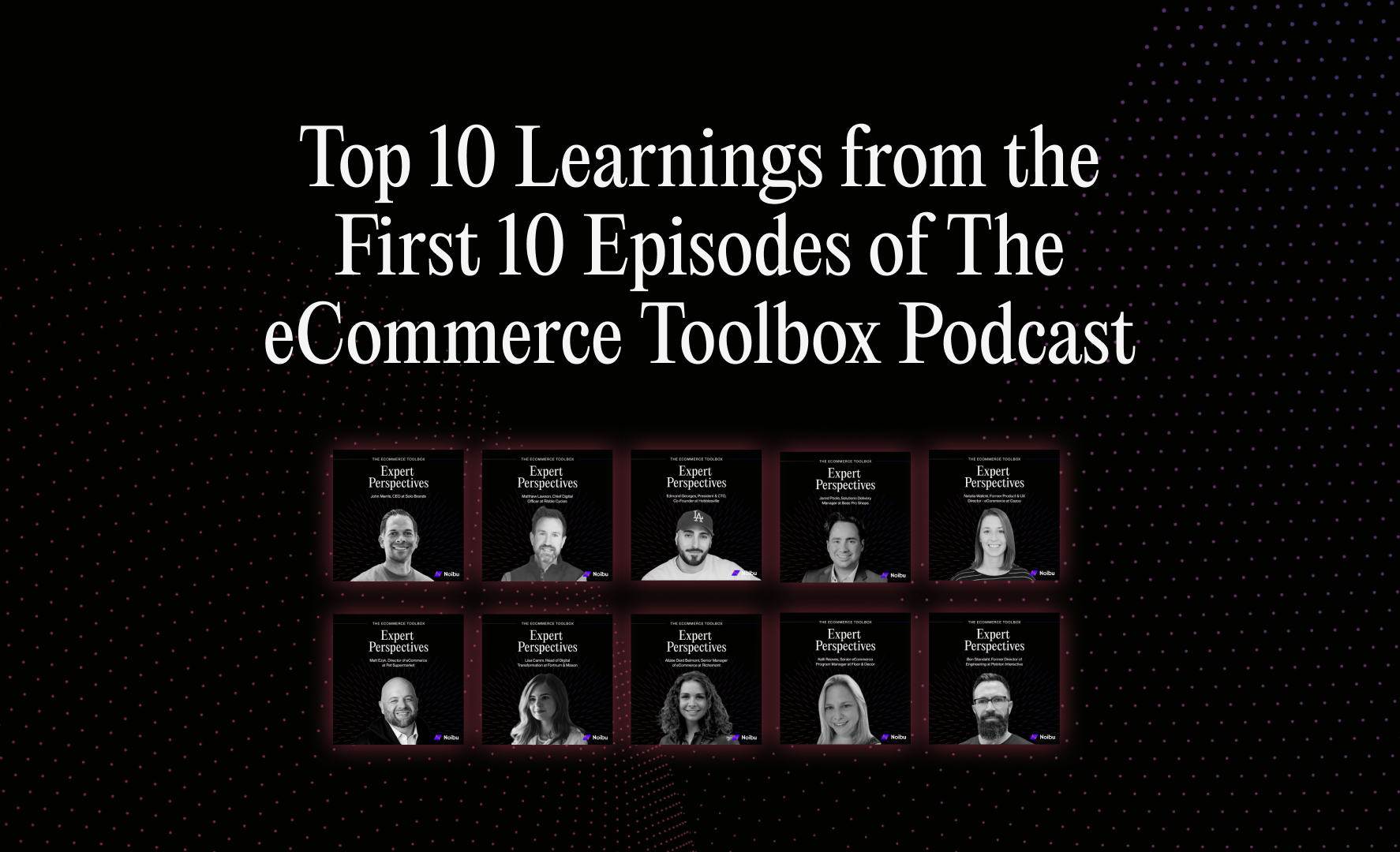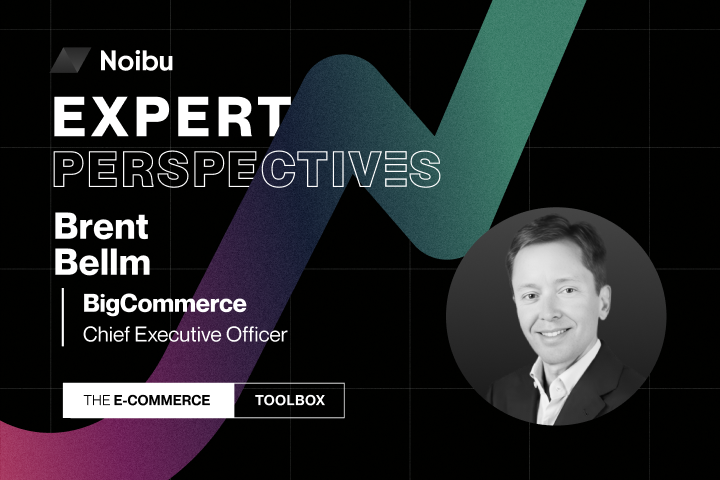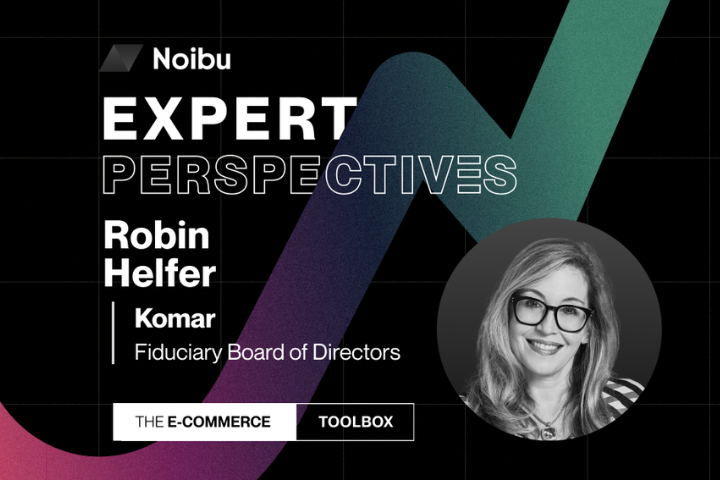The eCommerce Toolbox: Expert Perspectives podcast has officially hit 10 episodes! That’s right, host Kailin Noivo has sat down with ten different eCommerce experts to discuss all things eCommerce, including trends, predictions, preparing for the future, and learnings from the past.
Keen listeners will have noticed that in almost every episode, Kailin asks our guests about the one thing eCommerce brands need to stop doing, the biggest advice that they have for fast-growing teams, their perspective on the role of AI in eCommerce, and so much more.
Now, they have all provided such incredible answers that we just had to put together a list of takeaways to help you all uplevel your eCommerce game.
Are you ready? Let’s get into it:
Move Away From the “Growth At All Costs” Mentality
John Merris, the CEO of Solo Brands, joined us first and had the following sage advice: “Stop growing at all costs.”
He explains that there is a stigma in the world of DTC brands that they know how to grow, but don’t know how to generate profit. The Solo Brands team is working to debunk that, and they have been profitable since day one.
In order to be profitable, eCommerce brands need to fix their model to stop chasing growth and instead chase profit. After all, a business that is making a profit but not necessarily growing quickly is still a healthy business.
Catch the whole conversation here:
Apple: https://bit.ly/3rPKXiR
Spotify: https://bit.ly/3rNaxW0
Stop Looking for the Silver Bullet
Ribble Cycles’ Chief Digital Officer, Matthew Lawson advises brands to “stop looking for that one thing that’s going to be the win.” Whether that be a new SaaS technology, a new platform, or even the new website you’re designing,
Matthew is clear that you cannot expect it to be the one thing that makes you successful. To him, wins come from the graft, from grinding out work. There is no such thing as an easy win to scale, it’s all about incrementality and the marginal gains in every channel.
No matter how great you think your new experience is, chances are it will introduce new problems and issues that you will have to work on. However, he says if “you keep on dialing out that new experience, it’ll be far better than it was before.”
Catch the whole conversation here:
Apple: http://bit.ly/3YqYqKm
Spotify: http://bit.ly/3OwSNFU
Always Give Customers Abundant Choice
Matt Ezyk, the Director of eCommerce at Pet Supermarket, is a strong proponent of allowing customers choice. He says, “Whether it’s checking out as a guest or certain journeys they have on their site, the way I look at it is that you need to make things easy and available for how they want to check out and how they want to experience your site and then let them choose how they do that.”
At the end of the day, in a physical store, you wouldn’t force your customers to walk down certain aisles if they didn’t want or need to, so why do it digitally?
As a fifty-year-old retailer with many loyal customers who have stuck around for decades, we’re inclined to believe Matt and Pet Supermarket here.

Catch the whole conversation here:
Apple: https://apple.co/3OONxO0
Spotify: https://spoti.fi/45BkeW3
Scale Responsibly
Edmond Georges, President, CTO, and CO-Founder of Hobbiesville, has always maintained an ethos around scaling responsibly, similar to John Merris.
He says, “We saw the end of an era where all people cared about was top-line revenue. And it was like, as long as we’re growing and we’re growing fast, then we will continue to be able to get money to fuel burn and to inevitably hit this future tier of profitability.“
They never wanted to be in the same ballpark and so they have been bootstrapped since day one. Three years into the game, they’ve hit eight figures in revenue, so maybe it’s worth thinking about Edmond’s approach for your brand.
Catch the whole conversation here:
Apple: https://bit.ly/3Z8R5iM
Spotify:https://spoti.fi/44FlWVw
Stop Being Absorbed in Analytics
Jared Poole of Bass Pro Shops strongly believes that eCommerce brands are getting too wrapped up in their analytics. With the influx of AI, it’s almost become too easy to personalize experiences for consumers, often going too far and pushing customers away.
In fact, getting stuck in a cycle of thinking about the next thing you can offer your customers can lead to completely irrelevant suggestions, where your own opinions bleed into the data. Jared explains, “When we get into that mindset of what’s the next thing we can suggest for Joe or what’s the next thing we can suggest for Sally that would make them want to buy, a lot of times we’re letting our own opinions kind of bleed into this.”
Catch the whole conversation here:
Apple: https://bit.ly/469UiRI
Spotify:https://spoti.fi/48jVCDp
Avoid Over-Personalizing Customer Experiences
In a similar trend, Natalia Walicki, former eCommerce Product and UX Director at Cazoo, also advises brands to step away from over-personalizing experiences. Nowadays, the trend is to utilize data and AI to repeatedly suggest products and services to customers.
Natalia disagrees with this. She says, “I think that sometimes companies take us as consumers for granted. At the end of the day, you know, you kind of know what you’re looking for and what you want to buy.“
To Natalia, it’s time to step back and think about what customers want, thinking like them. That is what being customer-obsessed really means.
Catch the whole conversation here:
Apple: https://apple.co/3Q2YNZ0
Spotify:https://spoti.fi/3Q2SF2T
AI is Invaluable to eCommerce Success
Lisa Camm, Head of Digital Transformation at Fortnum & Mason, is, like most of us, exploring the potential benefits of AI to the brand. They have been exploring everything possible with it and seeing that it’s far more than a buzzword, it’s an invaluable tool in some instances.
However, she recommends avoiding overusing it in AI on the customer service side, explaining “We don’t want to lose that connection we have with our customers and that personal human touch.”
Catch the whole conversation here:
Apple: https://bit.ly/46wxGva
Spotify: https://bit.ly/3rM0CQY
Don’t Neglect Front End Bugs and Instability
Alizée Dard Belmont, Senior Manager of eCommerce and Innovation at Richemont, is realistic in her view that websites are always going to have issues, but she strongly recommends that brands focus on the front-end instability before the back-end.
She says “For instance, you go to a boutique, I don’t know, you cannot open the door. Like there is a problem. It’s the same. You go to the website, you cannot just click on the button, like add to cart or I don’t know, like complete my purchase. It’s just like, all right, so I’m not going to come. I’m not going to find the product. So this is just too bad. I’m going to go to the competition or whatever, or I’m just going to find it on another channel.”
If brands neglect to fix their front-end bugs, they will lose revenue and potentially long-term customers. She adds that of course the back-end systems should still be maintained, but they should not be your priority.
Catch the whole conversation here:
Apple: https://apple.co/3tRXqnf
Spotify:https://spoti.fi/3QhQGqt
Customers Shouldn’t Have to Work Hard to Use Your Site
Kelli Reeves, Senior eCommerce Program Manager at Floor & Decor, is a strong proponent of creating seamless user experiences. It’s no surprise then that her advice is to stop the narrative that customers will work harder to use your site, even if they face errors:

Every time a customer leaves and comes back, or repetitively refreshes the page to overcome errors and slowness, you are delaying revenue. Brands need to put themselves in the shoes of their customers and think about what is creating a negative brand memory or shopping experience, then take steps to fix those issues.
Catch the whole conversation here:
Apple: https://apple.co/3QZiEJ6
Spotify:https://spoti.fi/3SFE8fc
Ensure Your Marketing Methods Aren’t Intrusive
Ben Stendahl, former Director of Engineering (Web Content and Web Platform) at Peloton Interactive, is another eCommerce expert obsessed with the customer experience. His advice? Stop using modal overlays everywhere.
He says, “There is nothing that irritates me more and that I see in full story logs quicker […] as it is modal pop-ups.” He strongly encourages product, design, and engineering teams to develop marketing methods that are far less intrusive and annoying to customers.
Catch the whole conversation here:
Apple: https://apple.co/4a1u2vF
Spotify: https://spoti.fi/40YtNx0
So, there you go, ten things to avoid doing for eCommerce brands, brought to you by the best of the best. If you haven’t had a chance to listen to any of these episodes, be sure to tune in and take home some actionable insights on how to improve your eCommerce strategy for 2024.



